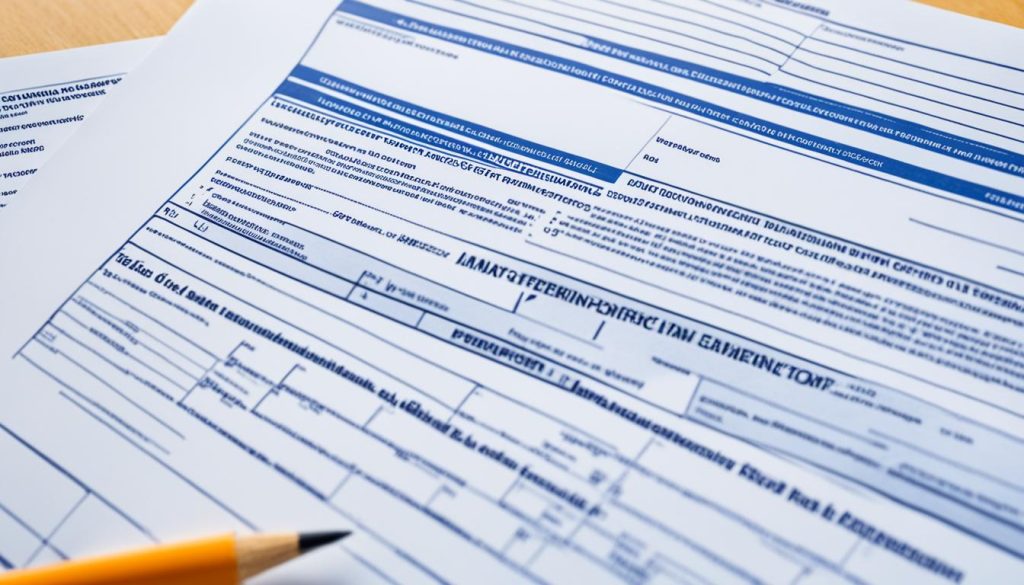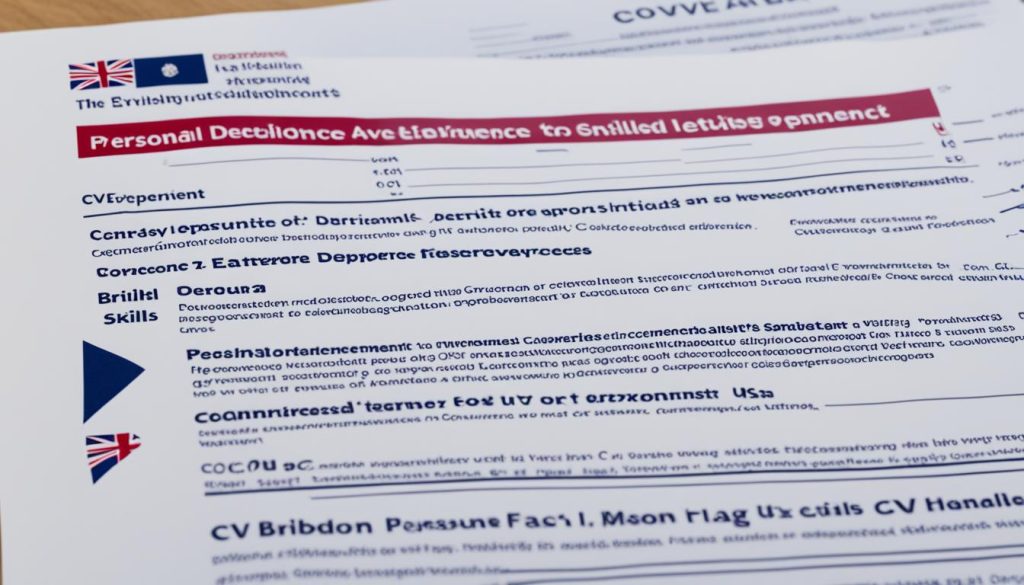Embarking on a job hunt in the UK is thrilling, full of diverse working options. It’s a journey promising for both locals and international talents. Our British job search guide aims to help you uncover these opportunities across various industries.
We’ll dive into British workplace culture and the legal rules of working. Our goal is to equip you for success in the UK job market. Together, we’ll explore the best ways to find your perfect role in this vibrant landscape.
Understanding the UK Job Market

The UK job market changes often, shaped by things like Brexit. By looking at fresh data, we get a clear view of jobs in the UK, including how Brexit affects work. This helps people looking for jobs or wanting to understand the market better.
Industries with High Demand for Workers
Statistics show a growing need for workers in certain UK industries. The healthcare field needs more staff, like doctors and nurses, because the population is ageing. Tech companies are also searching for IT experts, especially in cybersecurity and data science. And, there’s a big need for skilled people in construction.
Regional Employment Trends
Jobs are not the same everywhere in the UK. Places like London and Manchester are booming, offering lots of opportunities in finance and tech. But, some regions are developing slower due to their history. Efforts are being made to boost jobs in these areas, especially in green energy and digital work.
The Impact of Brexit on Employment
Brexit has had different effects on jobs in the UK. Some jobs in finance have moved to Europe because of new rules. Manufacturing faces both problems and chances because of changes in how things are made and sold. Brexit also means fewer skilled workers from the EU in agriculture and hospitality. The UK is trying to address these issues with training programs and new visa rules.
Navigating UK Work Visas and Regulations

Moving to the United Kingdom for work is a big step for many people around the world. But, before you pack your bags, knowing about the UK visa application process and the work permit regulations in the UK is crucial. The rules for employment laws can be tricky. This guide will help clear things up. It’s all about what you need to work in the UK legally.
- Types of Work Visas: The UK has different visas for work, like the Skilled Worker visa, the Health and Care Worker visa, and the Global Talent visa. Each one is for specific jobs and skills.
- Application Essentials: To get a job in the UK, you need an offer from an approved employer. You must also show you speak English well. There are other requirements, depending on the visa you want.
- Regulatory Framework: The UK’s job rules are strict to protect workers and make sure everyone is treated fairly. They stop bad treatment and make a fair work environment.
It’s smart to look carefully at the rules and get your visa paperwork right. The UK Government’s Visa and Immigration website has all the information you need. Getting advice from immigration law experts is also very helpful. It can make your visa application successful. Knowing all about these points is very important for anyone wanting to work in the UK. It helps you have a good start to your job there.
The Importance of Accreditation and Qualifications

In the UK, the need for accredited UK qualifications is growing. Today’s job market is competitive. Having accredited qualifications is key to success. It shows your skills are up to UK standards. This is very important if you’re bringing qualifications from another country.
Professional certification and credential recognition open up many job opportunities. They tell employers you have proven skills. It matters a lot in fields like health care, engineering, and education. Knowing how your qualifications compare to UK standards is crucial.
- Accredited UK qualifications are needed for many jobs, and lacking them can close doors.
- UK NARIC helps by checking if foreign qualifications match UK standards.
- To get professional certification in the UK, you may need extra training or exams.
Prestigious foreign qualifications are valued all over the world. But in the UK, they must be assessed to see if they meet local employer needs. Without this, securing a job in the UK might require help from organizations like UK NARIC.
To conclude, the importance of having accredited UK qualifications, professional certification, and credential recognition is huge. These accreditations show your education and skills are valid. They make you stand out in the UK job market. Often, they are essential for your career.
Finding Employment Opportunities in the UK

Looking for jobs in the UK involves a mix of methods. You can use job platforms, connect with others professionally, and get help from employment agencies. Taking full advantage of online resources can really help improve your chances. Let’s explore the best ways to secure a great job in the UK.
Top Job Search Websites and Resources
Starting your job hunt can feel daunting. But, UK job search websites can simplify the process. Sites like Reed, Indeed UK, and Monster UK have numerous job listings in different fields. They let you search for exactly what you want. For government jobs, check out Gov.uk’s ‘Find a job’ service for many vacancies.
- Reed.co.uk – Covers various industries, making it a top choice for job seekers in the UK.
- Indeed.co.uk – Known for its wide-ranging search engine that pulls listings from various sources.
- Monster.co.uk – Offers custom job alerts and gives career tips along with job listings.
- Gov.uk/Find-a-job – The go-to for public sector job opportunities.
Networking Strategies
Networking is key in the UK job market. It can open doors to jobs that aren’t advertised and provide helpful career tips. Getting involved in industry events and joining LinkedIn groups can help you meet people who can assist in your career path.
- Take part in career fairs and industry-specific events.
- Be active on online forums and platforms like LinkedIn.
- Make the most of university and professional association alumni networks.
Utilising Recruitment Agencies
Recruitment agencies in the UK can be very helpful. They match you with jobs that fit your skills and goals. Agencies such as Hays, Michael Page, and Randstad specialize in placing candidates in various sectors. They also provide CV tips and help with interview prep to improve your chances of getting a job.
- Hays – A top recruiter with a vast database and deep industry knowledge.
- Michael Page – Offers services across many sectors globally.
- Randstad – Helps find both temporary and permanent positions in different fields.
Finding a great job in the UK means using job websites, networking, and maybe getting help from agencies. Combining these strategies will boost your job search success.
Preparing a British-Style CV and Cover Letter

Starting your job hunt in the UK means you need a top-notch CV and cover letter. They are your chance to show off your skills and eagerness for the role. It’s important to get familiar with the British way of making a CV and cover letter. This includes knowing the right structure and what makes them stand out to employers in the UK.
Essential Components of a UK CV
Your British CV should have important parts that prove you’re right for the job. Let’s go through them:
- Contact Information: Your name, job title, and how to contact you should come first.
- Personal Statement: This is a short, powerful overview of your abilities, history, and job goals.
- Work Experience: Show your past jobs, starting with the latest. Focus on what you achieved and your duties.
- Education: Share your schooling history, including what degrees you have and where you got them.
- Skills: Keep a brief list of skills that match what the job asks for.
- Additional Sections: You might also add sections for things like certificates, volunteer work, or interests if they’re relevant.
Differences Between a CV and a Resume
In the UK, a CV is not the same as a resume. A CV is a detailed overview of your job history, often more than two pages. It doesn’t change much between job applications, except maybe the personal statement or cover letter. On the other hand, a resume is short, about one page, and customized for each job. This difference is key when you’re applying for jobs in the UK.
Tailoring Your Application to the Job Description
Making your application specific to the job is crucial. It shows you really want the job and that your skills are a perfect match. Here are the steps to do that:
- Read the Job Description: Find out exactly what the employer wants.
- Match Your Skills: Show how your talents meet the job’s needs.
- Quantify Achievements: Use numbers to show how well you’ve done in past jobs.
- Company Knowledge: Prove you know the company by mentioning how you can help it succeed.
- Final Flourish: End strongly, showing your excitement for the job and inviting them to contact you.
By following these tips for your British CV and cover letter, your application is more likely to succeed. This could lead to an exciting career opportunity in the UK.
The Interview Process in the UK

When you go for a job interview in the UK, it’s crucial to know British hiring practices, prepare well, and follow interview rules. Landing a job in the UK involves steps to let both you and the employer see if you’re a good match for the job.
Research is key in a UK job interview. You should understand the company’s past, what it stands for, and its recent wins. Matching the job description to your skills and experiences also helps a lot in the interview.
- Research the company and its industry to demonstrate knowledge and enthusiasm.
- Practice responses to common interview questions that relate to both technical and soft skills.
- Dress appropriately for the industry to align with UK interview etiquette.
- Prepare meaningful questions to ask the interviewer, showcasing engagement and forward-thinking.
Good interview manners in Britain mean being on time, having a firm handshake, and making eye contact. This shows confidence and professionalism. And don’t forget, sending a thank you email after the interview shows you’re still interested in the job.
- Arrive 10-15 minutes early to the interview venue.
- Bring necessary documents, such as copies of your CV, identification, and certificates.
- Be polite and articulate, while also being concise in your responses.
- Follow up with a personalised thank you email reiterating your interest in the role.
A successful interview leaves both parties feeling positive about working together. With the right prep and a good grasp of interview etiquette, you can make your way through the UK hiring process. And you might just land the job you want.
Understanding UK Employment Contracts and Worker Rights
Navigating the UK employment scene is essential. It helps both employers and employees understand their stand. Knowing your rights in the workplace boosts your confidence and ensures fair treatment by law. It’s also vital to understand UK taxation for effective financial management. We will look into employment contracts, worker rights, and tax management here.
Types of Employment Contracts
In the UK, formal agreements between an employer and employee are outlined in employment contracts. These define the job’s terms and conditions. They vary based on the job type. Here are the common contracts you’ll find:
- Permanent Contracts – These offer stability and are usual for full-time and part-time jobs.
- Fixed-Term Contracts – These have a set end date, common in project work.
- Zero Hour Contracts – These offer flexible working hours without guaranteeing fixed work time.
Understanding Your Rights as a Worker
Knowing your rights in Britain is fundamental. These rights keep you protected and ensure fairness at work. Everyone should know these key rights:
- The right to a minimum wage for fair pay.
- Rules on working hours, including maximum work time and breaks.
- Entitlements to leave, covering annual, maternity/paternity, and sick leave.
Navigating the UK Tax System
The UK tax system can be tricky but learning about it is crucial for earning management. Here are the basics:
- Income Tax – It’s taken from your salary based on how much you earn.
- National Insurance – This is your contribution for benefits and the State Pension.
- Tax Code – HM Revenue & Customs gives this to show your Income Tax rate.
Getting to grips with employment contracts, your rights, and tax rules makes working in the UK smoother. For deeper insights, HM Revenue & Customs offers plenty of guidance.
Adapting to British Workplace Culture

Understanding how to behave in a British office is crucial for anyone aiming to excel there. It’s more than good manners; it’s about building positive relationships and respecting the office vibe. By getting to grips with the nuances of UK professional life and balancing work with personal time, you can find both joy and achievement in your career.
Workplace Etiquette in the UK
Learning the ropes of a new workplace means understanding local business behaviour. In the UK, being on time, keeping things formal yet respectful, and working well with others is valued. It goes beyond just looking smart and shaking hands properly. It’s about taking the initiative, helping out, and picking up on the unspoken rules that keep things running smoothly.
- Respect the privacy and personal space of colleagues.
- Be up-to-date with current events, which often serve as light conversation starters.
- Prepare for meetings thoroughly, valuing both your and others’ time.
The Role of Socialising in Professional Settings
Though work is important, socialising also has a big role in the UK. It helps you meet people, get ahead in your career, and build a tight-knit team. Activities like going for drinks after work, having lunch with your team, or joining in company events underline the importance of personal connections at work.
- Accept invitations to social gatherings to show openness to team bonding.
- Engage in conversations that may not be work-related to build rapport with peers.
- Understand and respect the diversity in cultural backgrounds and social norms.
Work-Life Balance Considerations
Keeping a good balance between work and personal life in the UK is not just an idea; it’s a way of life. People believe that a rested and happy worker is more effective and valuable. Using flexible hours and taking your full holiday allowance is key to thriving professionally in the UK.
- Prioritise tasks and manage time efficiently to reduce the need for overtime work.
- Take your full entitlement to leave days to recharge and prevent burnout.
- Seek support from your employer for flexible working arrangements if needed.
Accommodation and Relocation Tips for Newcomers

Moving to Britain for work is exciting but can also be a bit scary. Finding a place to live in the UK is key for a smooth start. Our guide offers vital advice to help you settle in quickly.
-
Start looking for a place as soon as you know you’re moving. The UK’s property market is busy, especially in popular areas.
-
Work out your rental budget. Remember to include extra costs like council tax, bills, and travel expenses.
-
Think about location. Consider how close you are to work, buses and trains, and shops. Each part of the UK is different in its own way and living costs vary.
-
Look into different types of homes. The UK has many options, from city flats to country houses. Pick what suits your lifestyle and family the best.
-
Learn about rental agreements. It’s crucial to understand your rights and duties as a tenant in the UK.
-
Get ready for your move. Choose a trustworthy removal company for your things. You might also need to think about storage if you’re moving from another country.
Think about starting with temporary housing. This can make it easier to find your perfect home after you arrive. Many people moving to the UK find this helpful in reducing the stress of house hunting from a distance.
-
Look at short-term places to stay. Serviced apartments or short-term rentals can offer a cosy place while you look for a long-term home.
-
Seek help from relocation agencies. They provide helpful insights and support based on your needs.
-
Join local groups or forums. They are great for getting advice and tips from people who have already settled in.
When you find the right place, be ready to move fast. Good homes go quickly. With these tips and some planning, your move to the UK will be both successful and enjoyable!
Working in the UK: Visa Sponsorship and Skilled Worker Routes

Getting the right to work in the UK is key for global professionals looking to grow in their careers. The UK skilled worker visa is a route for those with job offers from UK employers. This visa follows a points-based system focusing on qualifications, salary, and English skills.
Looking for sponsorship for UK employment means finding an employer approved by the UK Home Office. A sponsor shows you have a real job offer. This is crucial for the application, proving one can fill a job the UK economy needs.
- Understanding the Points-Based System: Candidates must meet a 70-point benchmark, with mandatory and tradeable points.
- Finding a Sponsor: Engage with companies holding a valid Sponsor Licence that corresponds to the job offer.
- Compliance with Eligibility Requirements: Ensure that the job offer meets the skill level and salary requirements as stipulated by the visa route.
Looking into visa routes for professionals often points to the Skilled Worker visa. However, there are other visas too. The Global Talent, Innovator, or Intra-company Transfer visas may also be an option, based on your job, skills, and experience.
Advice from immigration experts and success stories help in understanding the UK visa system. It’s important to know the latest rules and get professional advice for a successful visa application.
Professional Development and Career Advancement
Professionals in the UK are seeing how vital continuous learning is for their careers. CPD helps them get better at their jobs and know more, making them more likely to get ahead in Britain. This growth not only helps them but also boosts the country by making the workforce more skilled, driving innovation and productivity.
Continuous Professional Development (CPD) in the UK
There are many CPD choices out there. People can pick from courses, seminars, and workshops that match their industry and career level. Accredited organizations and professional institutes provide CPD programmes. These keep professionals up-to-date with the latest trends and best practice in their field.
- Industry-specific qualifications and workshops.
- Online courses and webinars for flexible learning.
- Advanced training within company development schemes.
Effective CPD is key to career growth in Britain. It shows dedication to your profession and being proactive about your career.
Securing Promotions and Moving Up the Career Ladder
To get promoted, you need a smart plan that combines CPD with proven work achievements. It’s about showing you can lead, doing better than expected, and sharing your vision for your role and the company.
- Setting clear career objectives and communicating these with management.
- Undertaking leadership roles or projects to demonstrate capability.
- Networking with industry leaders to learn from their trajectories.
Being recognized is vital for career growth in Britain. It comes from hard work, smart professional positioning, and being seen within your organisation.
Mentorships and Further Education Opportunities
Mentorship programs in the UK offer personal guidance and insight into the industry. Being mentored by an expert helps with career choices and opens doors to important networks. Further education, like part-time degrees or vocational training, is also crucial for moving up in your career.
- Tapping into industry mentors through UK mentorship programs.
- Expanding qualifications through postgraduate studies or vocational courses.
- Attending industry conferences and networking events to build contacts.
Together, focusing on CPD, seeking promotions, and exploring mentorship and education helps individuals advance their careers. It also keeps the UK at the forefront of hosting highly skilled professionals.
The Role of Trade Unions in Securing Workers’ Interests
In the UK, trade unions are vital. They ensure workers are heard and fight for fair work conditions. Their efforts make the workplace better for everyone.
Joining a Trade Union: Pros and Cons
Deciding to join a trade union has both good and bad sides. Being part of one gives you power in numbers to get better wages and conditions. But, you might have to strike or take part in actions the group decides on.
- Pros:
- Enhanced bargaining power for wage increases and benefits
- Access to legal assistance and support in workplace disputes
- Increased influence in shaping industry standards and practices
- Cons:
- Possible clashes with bosses and strikes
- Fees and dues for membership
- Could cause division in places without a union
How Trade Unions Influence the Work Environment
Trade unions play a big role in bettering workers’ lives. They lobby and talk with employers for a safer, secure workplace. They ensure employees have a say in big decisions.
Negotiating for Better Work Conditions
Unions are key in fighting for workers’ rights in the UK. They push for things like longer maternity leave and safer work places. Thanks to them, work life has improved for many.
- Making plans for better contract terms
- Organising bargaining talks with bosses
- Reaching deals on pay, hours, and more
Challenges of Working in the UK as an International Employee
Starting work in the United Kingdom comes with its unique problems, especially for international workers. These challenges mainly relate to fitting into the work and cultural setting.
Overcoming Cultural and Language Barriers
Many people find the language the biggest barrier. Understanding English and the British way of talking is essential. It helps in building good relationships with workmates and clients.
Engaging in language courses and seeking local language partners
Understanding and embracing British social and business etiquette
Participating in cultural trainings to navigate the professional landscape confidently
Recognition of International Qualifications
International professionals often worry if the UK will accept their qualifications. It’s crucial to make sure your qualifications are recognized to get good jobs and grow in your career.
- Utilising services like UK NARIC for credential evaluation and recognition
- Attaining additional UK-specific qualifications if necessary
- Liaising with professional bodies related to one’s field for guidance and support
Access to Support Services and Communities
Finding help and people with shared experiences makes work life easier. There are many services and groups ready to help foreign workers in the UK.
- Connecting with expatriate networks and cultural associations
- Utilising resources provided by local community centres and employment services
- Exploring online forums and social media groups for advice and camaraderie
Financial Planning for Working in the UK
Starting a new job in the UK is not just about a new work scene. It also calls for careful money planning. To help those adjusting to life in Britain, we’re looking at key tips for UK financial planning for employees. It’s especially important to manage your money well, with UK cost of living advice in mind. Let’s explore some vital tips.
-
First, make a realistic budget based on your income and the cost of living. Remember to include basics like housing, food, and healthcare in your managing finances in Britain plan.
-
Look into the living costs of different areas. Since costs can vary, picking the right location is key.
-
Try to save up each month for emergencies. It’s good to have savings that cover at least three months of expenses.
-
It’s crucial to understand UK taxes. Knowing how to handle your taxes can prevent unexpected tax bills.
-
Think about saving and investing. It might help to get advice from a financial advisor tailored to your situation.
-
Keep checking and changing your budget as needed. This way, you stay in charge of your money and can adjust to any cost of living changes.
As you settle into your new job, effective finance management can make your UK work life smoother. For UK cost of living advice, connecting with expat groups and getting advice from expert financial advisors on UK financial planning for employees is wise.
Success Stories: Immigrants Thriving in the UK Workforce
Immigrant success stories in the UK are both rich and varied. They offer many inspirational work stories. These contribute to the British economy’s dynamic makeup. Such stories show personal wins and how migrants become key parts of the UK workforce.
Inspirational Career Journeys
Migrants have climbed high in different fields, breaking barriers and setting excellence standards. Their paths show hard work towards professional success and living the British dream. From tech founders to healthcare heroes, their stories inspire many.
- Dedication to acquiring local qualifications and expertise.
- Adaptation to British workplace culture while preserving one’s own identity.
- Overcoming language barriers to excel in communication-intense environments.
Learning from the Experiences of Others
Sharing UK immigrant success stories shines a light of hope. It’s a way to learn. These stories offer practical advice for navigating the British job market and growth.
- Utilising community networks for mentorship and opportunities.
- Effective leveraging of professional skills to meet critical demand.
- Embracing continuous learning and professional development.
Community Contributions and Integration
Different cultures coming together enrich the UK. Immigrants’ contributions go beyond jobs, boosting community ties and cultural exchanges. This makes society more cohesive and collaborative.
- Active participation in local community services and events.
- Launching ventures that serve both the migrant and local populations.
- Advocacy for inclusivity and diversity in the workplace.
Conclusion
In wrapping up this detailed guide, we have travelled through the UK’s employment scene. You now have the tools to start or progress your career in Britain. This guide has explored the lively job market, complex visa rules, and the esteemed British work culture. It aims to be a guide and a compass as you tread the professional paths of this great nation.
The UK offers many opportunities and some unique challenges. We’ve looked at these carefully in the article. Remember the importance of preparation as we conclude our thoughts on British jobs. This includes understanding how to write a CV, getting familiar with employment contracts, and knowing your rights as a worker. Being ready and adaptable is key to a smooth entry into the UK job market.
Your adventure is just starting. Use the insights and strategies we discussed as your base. Stay updated with the latest trends that could impact your job search and career progression. With hard work, the right skills, and knowledge of what British employers want, you can carve out a successful career in the UK’s dynamic job scene. Good luck with your future efforts in joining the professionals that boost the vibrant UK economy.
















